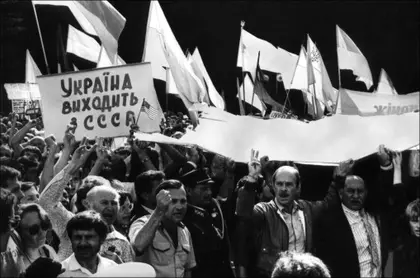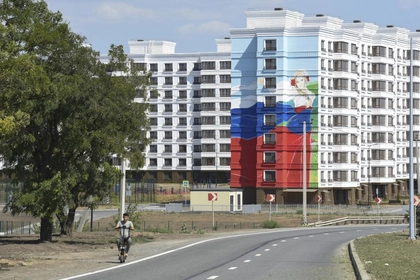On Aug. 24, 1991, the then still Soviet Ukrainian parliament declared Ukraine’s independence. But what actually happened on that historic day? And what were the unexpected dramatic circumstances that precipitated this momentous breakthrough?
Let me share with you some insights drawn from my book The Ukrainian Resurgence (1999) which dealt with those critical years in Ukraine’s history.
JOIN US ON TELEGRAM
Follow our coverage of the war on the @Kyivpost_official.
After Soviet leader Mikhail Gorbachev began relaxing political controls during the final years of the 1980s, through his policies of perestroika (restructuring) and glasnost (openness), Soviet Ukraine began to gradually loosen the strong conservative grip in which Moscow had kept it with the help of its vassal, the Communist Party leader in Ukraine, Volodymyr Shcherbytsky.
A spontaneous popular movement uniting Ukrainian democratic patriots known as “Rukh” (The Movement) gradually coalesced in which former political prisoners and leading intellectuals, especially writers, who were prepared to beak with the Communist system made common cause in promoting democratic reforms and national self-determination. In September 1989, Gorbachev was forced to replace Shcherbytsky; and in July 1990, the Soviet Ukrainian parliament, now containing a minority of democratic lawmakers, proclaimed the “state sovereignty” of the republic.
So, by the first half of 1991 Ukraine had gradually caught up with the emancipatory processes taking place in the other non-Russian republics, but an attempted putsch in Moscow by Communist hardliners on Aug. 19-22 suddenly placed all the progress achieved in jeopardy.

IMF Approves $1.1 Billion Loan Disbursement to Ukraine Before Trump Inauguration
Paradoxically, the mood and responses in Ukraine… were largely conditioned by what occurred in Moscow
Ukraine’s Communist leaders – the most notable of whom at this stage was the speaker of the parliament, Leonid Kravchuk – vacillated. There were mass protests against the putsch in Kyiv, but the democratic opposition was unable to persuade him to convene an emergency session of the parliament. Only when it became apparent that the putsch had failed did he agree to hold an emergency session of the parliament on Aug. 24 – a Saturday.
When the danger had passed, the opposition – which had formed a coalition calling itself “Independent Democratic Ukraine,” began to demand that the Communist Party be stripped of its power and assets, and that independence be declared.
Paradoxically, the mood and responses in Ukraine and other non-Russian republics were largely conditioned by what occurred in Moscow. It was there that the disintegration of the Soviet Union was irrevocably set in motion by the reaction to the abortive putsch.
On Aug. 22, outside the KGB headquarters in the Soviet capital, angry crowds toppled the statue of Felix Dzerzhinsky, the founder of the Soviet secret police. In Estonia and Lithuania, the Communist Party was banned. And in Kazakhstan, its Communist leader, Nursultan Nazarbayev, resigned from the party and ordered the “departization” of his vast Central Asian republic, that is, stripping the Communist Party of its exclusive ruling role.
The following day, Kravchuk flew to Moscow where he witnessed the public humiliation of Soviet party leader Gorbachev by Boris Yeltsin, who had broken with the Communist Party and was spearheading the movement for democratization within the “sovereign” Russian Federation.
Totally unexpectedly, Yeltsin suspended the activities of the Communist Party in the Russian Federation, ostensibly pending the investigation of its role during the attempted putsch. Communist Party offices were sealed in Moscow and Leningrad.
It was against this politically surreal background that Kravchuk returned home to face the music along with his stunned and beleaguered party colleagues. They were in effect fighting for their political lives. An epoch had come to an end and major concessions would have to be made if they were to avoid not only being swept from power but also retribution.
Kravchuk warned that Yeltsin’s actions had produced “a very dangerous” wave of “drunken democracy.”]
The extraordinary session of the parliament lasted for over 12 hours and was broadcast live on state TV and radio. Initially, there was only one item on the agenda – the political situation in the republic after the attempted putsch and how to safeguard the republic’s sovereignty from possible new threats in the future.
But the opposition was determined not to let Kravchuk and his comrades off the hook and to capitalize on this unprecedented situation.
Kravchuk defended his behavior from a barrage of criticism. He agreed on the need to strengthen the republic’s sovereignty and security, but stopped short of mentioning independence. He also tried to defer the issue of departization. The leader of the Communist Party of Ukraine, Stanislav Hurenko, was prevented from speaking because of the jeering.
After a break to defuse the tension, the democratic opposition seized the initiative. The poet Dmytro Pavlychko urged the chamber not to get carried away by emotions and to concentrate on three priorities: proclaiming independence, asserting control over all military units in the republic’s territory, and departization. Hurenko protested that the session was being turned into a “lynch court.”
As the heated exchanges continued, the latest news from Moscow again played a sobering and catalytic role. The Russian authorities were unilaterally taking over the center’s structures, including the KGB. Yeltsin was placing his people in key positions and the Russian government had taken control over all Union economic and communications ministries.
One angry Ukrainian deputy, Valerii Batalov asked rhetorically whether Ukraine had any need of a union in which all the key positions would be held by Russians.
Kravchuk seized the opportunity to redeem himself and replied that he too had been “distressed and even annoyed” by the demands that “only Russians be appointed.” He warned that Yeltsin’s actions had produced “a very dangerous” wave of “drunken democracy.” Unexpectedly, he now recommended that the deputies support a Declaration of Independence.
Given this major concession, some of the tension subsided. But one of the leaders of the democratic opposition, Ihor Yukhnovsky, a scientist from Lviv, stepped up the pressure. He argued that proclaiming independence was not enough: It would be incomplete without ending the Communist Party’s monopoly of power – without the “decommunization” of the republic.
Yukhnovsky also caused a stir in his own ranks by proposing that the declaration of independence be endorsed by a referendum to bolster its validity. Extending a peace offering to the Communists, he also advocated that an orderly transition be carried out, and that there should be no recriminations against serving communist officials.
Kravchuk announced another break, and it was during the pause that a compromise formula was found. Representatives from the democratic camp (Pavlychko, Volodymyr Yavorivsky and others) initiated informal talks with the Communist majority. They advanced an argument along the following lines: “We were all once Communists under Moscow, but now a point of no return has been reached and independence is the only way forward. Let’s unite around independence.”
The overtures from the opposition turned out to be the lifeline that the communist majority had been seeking and they eagerly grabbed at it. “We were like blind kittens that had found a way out,” a leading Communist deputy of that time told me later in an interview.
The question of banning the Communist party was left aside for the moment. Apart from agreeing to independence, the Communist majority agreed on the departization of the republican procuracy, internal ministry, and KGB, and all military forces stationed in Ukraine.
To placate the Communist deputies, no reference was to be made of the declaration of Ukrainian independence on Jan. 22, 1918 by the parliament of that time, the Central Rada. Instead of emphasizing that Ukraine was in fact renewing, or reasserting its independence, the Communist majority wanted to save face and make it to seem as if they were now becoming the original co-authors of the country’s independence.
After even more debate, just before 6 p.m., Kravchuk was finally able to read out a consolidated Declaration of Independence that skipped around the issue of departization. It did, however, stress that this declaration was “continuing the thousand-year tradition of state development in Ukraine.”
When it came to the vote, 346 deputies supported it, one voted against (Albert Korneev from Donbas), and three abstained. It was agreed to put the Declaration to a republican referendum on Dec. 1.
To place things in proper context, the following should be noted. That same day Yeltsin effectively banned the Communist Party in Russia and took over its assets. He also recognized the independence of Latvia and Estonia. The following day, Belarus also declared independence.
Despite the victory of democratic forces in Moscow, Russian politicians were perturbed by the prospect of Ukraine going its own independent way. Within days, the parliament of the Russian Federation sent a high-level delegation to Kyiv. They witnessed Ukraine’s strong desire to be fully sovereign and for normal bilateral relations to be maintained with Russia based on equality, not dependence.
At a joint press conference with the Russian delegation on Aug. 29, Kravchuk referred to the “former USSR” for the first time. The following day, under mounting public pressure, the presidium of the Soviet Ukrainian parliament eventually agreed to ban the Communist Party in Ukraine and nationalize its property.
Finally, on Dec. 1, 1991, the referendum on independence produced a resounding, unambiguous vote in favor of it. This was the final nail in the coffin of the Soviet Union. By the end of the month, after more than 70 years, the Soviet empire had ceased to exist.
Today, 32 years later, Russian imperialists, revanchists, and revisionists embodied in Russian President Vladimir Putin’s regime are seeking to reverse history and restore their despotic Eurasian hegemony by force. But Ukraine is heroically fighting back with a young generation born in an independent country at the forefront of the armed resistance to Russia’s rapacious aggression. Moreover, unlike in the past, today Ukraine’s defense of its independence has the strong support of the democratic world.
See an earlier version of this article here.
You can also highlight the text and press Ctrl + Enter






